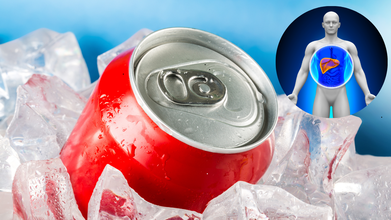- Health Conditions A-Z
- Health & Wellness
- Nutrition
- Fitness
- Health News
- Ayurveda
- Videos
- Medicine A-Z
- Parenting
- Web Stories
What Is Decaf Coffee? Know Its Benefits Over Regular Brew

What Is Decaf Coffee? Know Its Benefits Over Regular Brew
Coffee is often the first thing most people drink as soon as they wake up or when they want to stay awake, now the common notion is to choose between a cappuccino, latte or a solid espresso among the other known options, very few people are aware that decaf is also a coffee variant that has significantly less amount of caffeine.
Caffeine can trigger a variety of health troubles like anxiety, nervousness, upset stomach, disrupted sleep etc, recent studies have pointed out that daily coffee intake can also affect your heart leading to a number of cardiovascular diseases. Caffeine tends to linger and stay in the body for a long period of time and so decaf can be a 'lighter' option over these considerably 'heavy' caffeine brews.
What is Decaf Coffee?
The same kinds of beans, usually robusta or arabica, are used to make decaf coffee, but an additional process is taken to remove the majority of the caffeine from the green, unroasted beans. These beans are prepared for brewing by roasting, which brings out their inherent flavours and scent. But occasionally, the decaffeination procedure might lessen the flavour, making the coffee taste softer or less strong.
To assist liberate the caffeine, the raw beans are first steam-cooked in the standard decaffeination process. The caffeine is subsequently extracted from the beans using a chemical solvent, such as dichloromethane or ethyl acetate. The beans are next boiled to eliminate any remaining moisture and any solvent. Some people are worried about chemical leftovers even though the majority of the solvent evaporates during this operation.
Beneficial phytonutrients, particularly polyphenols, which are known to promote heart health and may aid in the prevention of certain diseases, are present in both normal and decaf coffee.
Soaking the beans in hot water to dissolve the caffeine is a safer alternate method of decaffeination. Since the beans don't absorb any solvents, this method is safer.
Caffeine Levels in Decaf vs Regular Coffee
In contrast to ordinary coffee beans, which contain 1.5% to 2% caffeine, decaffeinated coffee still contains a minor amount of caffeine, usually around 0.1%. About 97% of the caffeine is eliminated during the decaffeination process.
Here is a breakdown of the caffeine content of regular and decaf coffee per serving for easier comparison:
| Type of Coffee | Caffeine Content per 6 oz (177 ml) | Caffeine Content per 240 ml (8 oz) |
| Regular Coffee | 72 mg | 95-120 mg |
| Decaf Coffee | Less than 3 mg | Less than 5 mg |
**This comparison helps you understand the significant reduction in caffeine levels in decaf coffee versus regular coffee.
Benefits of Drinking Decaffeinated Coffee
For people who want to cut back on their caffeine intake, decaf, or decaffeinated coffee, is a popular substitute. It is created by roasting coffee beans to remove the majority of the the stimulant while preserving a large portion of its flavour. Despite not offering the same energy boost as normal coffee, decaf has a number of health advantages that make it appealing to many coffee consumers. The following are the top five health benefits of decaffeinated coffee:
1. Reduced levels of anxiety
Decaf coffee is a fantastic method for people who are sensitive to caffeine to enjoy coffee without feeling jittery, anxious, or anxious. For those who want a more laid-back coffee experience, this makes it a soothing option.
2. Improved Sleep Quality
One of the most significant advantages of decaf is its ability to promote better sleep. Unlike regular coffee, which can disrupt sleep patterns due to its caffeine content, decaf allows you to enjoy a warm beverage in the evening without worrying about its impact on your rest.
3. Heart Health Support
Research suggests that decaffeinated coffee may contribute to heart health. Studies have shown that it could help lower blood pressure and reduce the risk of heart-related diseases. The antioxidants present in decaf may play a role in these beneficial effects.
4. Gentler on the Digestive System
Caffeine can sometimes irritate the stomach and lead to acid reflux. Decaf, with its significantly lower caffeine content, is often easier on the digestive system. This makes it a suitable choice for individuals with sensitive stomachs or those prone to digestive issues.
5. Rich in Antioxidants
Decaffeinated coffee is packed with antioxidants, just like regular coffee. These antioxidants help protect the body from oxidative stress, which can contribute to chronic diseases. By incorporating decaf into your diet, you can reap the benefits of these powerful compounds.
Are there any Side-effects of Decaf?
The notion that decaffeinated coffee can keep you awake is a common misconception. While it's true that a trace amount of caffeine may remain after the decaffeination process, this residual caffeine is typically negligible.
The psychological impact of drinking coffee, whether decaf or regular, can be significant. The ritual of consuming coffee can trigger a placebo effect, leading individuals to feel more alert even with minimal caffeine intake. Conversely, some people may experience a sense of withdrawal or miss the psychological "boost" associated with regular coffee, potentially affecting their mood or energy levels.
Decaf coffee is generally less acidic than regular coffee. However, excessive consumption of decaf coffee can still increase the concentration of serum gastrin in your stomach, potentially leading to heightened stomach acidity.
How to Choose the Better Caffeine Drink?
The age-old question of whether decaf or regular coffee is better for you ultimately boils down to personal preference and individual circumstances. While both offer unique benefits and drawbacks, the ideal choice depends on factors such as your health, caffeine tolerance, and desired outcomes.
Decaf coffee is ideal for those sensitive to caffeine, offering the same taste without the jitters, anxiety, or sleep disturbances. Regular coffee, with its robust flavor, suits those needing an energy boost. Health conditions, like pregnancy, may necessitate decaf. Lifestyle factors, such as stress and sleep patterns, also influence choice. Ultimately, the best coffee aligns with your individual needs, preferences, and health goals, ensuring an enjoyable coffee-drinking experience.
Just One Can Of Soda Is Enough To Damage Your Liver, Diet Soda Could Make It Worse, Suggests Study

Credits: Canva
Drinking just one can of soda, whether regular or diet, can significantly increase your risk of developing a deadly liver disease, suggested new research. The study is conducted by the First Affiliated Hospitals of Soochow University in Suzhou, China, and the findings were presented at the United European Gastroenterology Week (UEG Week), 2025.
The study showed that people who consumed just 250 grams of soda daily, which is less than a standard 12-ounce can, had a higher likelihood of developing metabolic dysfunction-associated steatotic liver disease (MASLD), formerly known as the non-alcoholic fatty liver disease (NAFLD).
What was more alarming is that diet sodas appeared to be worse offenders, as the low or non-sugar sweetened beverages (LNSSBs) raised risk of MASLD up to 60%, while sugar-sweetened beverages (SSBs) increased it by 50%.
Also Read: If You're Alone At Home And Experience A Heart Attack, Here's How You Survive: According To Doctor
“These findings challenge the common perception that these drinks are harmless and highlight the need to reconsider their role in diet and liver health, especially as MASLD emerges as a global health concern,” said Lihe Liu, the study’s lead author and a graduate student in gastroenterology.
What Did The Study Find?
The study followed nearly 124,000 adults who did not have any liver disease as part of the UK Biobank, and tracked the participants' beverage habits over a 10-year period. The researchers used a 24-hour dietary questionnaire to assess how often and how much soda people drank.
As a result, a clear link between soda intake, even in small amounts and liver fat buildup, MASLD was seen. The researchers also discovered that soda intake led to excess fat accumulation in the liver, causing inflammation, scarring, and eventually conditions such as cirrhosis or liver cancer. As per the Cleveland Clinic, this kind of chronic liver damage can shorten life expectancy.
MASLD was once thought to affect only the people who consume a large quantity of sugar or alcoholic drinks, however, the new research now suggests that even less than one can of soda could increase the risk significantly.
Why Diet Soda Could Be Worse?
“Sugar-sweetened beverages can cause rapid spikes in blood glucose and insulin, promote weight gain, and increase uric acid levels, all of which contribute to liver fat accumulation,” explained Liu.
Also Read: Explained: What Are The 3 Scientists Awarded Nobel Prize In Medicine For?
However, the surprising part is that diet soda could cause more harm. Why? They are often marketed as the healthier option, however, they are more harmful due to the addition of artificial sweetener. "They may affect liver health by altering the gut microbiome, disrupting the feeling of fullness, driving sweet cravings, and even stimulating insulin secretion,” Liu said.
Even though diet sodas contain fever calories, they could confuse body's metabolic processes, making it harder to regulate appetite and blood sugar, both of which can contribute to liver fat buildup.
What Is The Impact?
MASLD is the leading cause of liver cancer and liver failure worldwide. In the US alone, it has surged by 50% over the past three decades and affects about 38% of the population.
The researchers suggested to replace soda with water. As per Liu, replacing sugary beverages with water could reduce the risk of MASLD by 12%, while replacing an artificially sweetened one lowered the risk by 15.2%.
“The safest approach is to limit both sugar-sweetened and artificially sweetened drinks,” Liu emphasized. “Water remains the best choice as it removes the metabolic burden and prevents fat accumulation in the liver, whilst hydrating the body.”
Croissant In a Gut-Friendly Food, Says NHS Surgeon

Credits: Insta and Canva
Whenever we have to think of a quick food, we think of breads. However, we are usually advised against it, but Dr Karan Rajan, NHS Surgeon has a different view to offer. He says that croissant, if made in the traditional way could actually be a gut-friendly food. “This is my legal argument to explain why croissants should be considered a gut health food. It has to be a traditional croissant because it is made using laminated yeast dough that undergoes slow fermentation. This process allows the yeast and lactic acid bacteria to partially break down some of the starches, making the final product easy to digest compared to under-fermented white bread,” he said.
What Is The Right Way To Have A Croissant?
He suggests that if you let a baked croissant cool down before eating, it helps turn the starch into resistant starch. This, also helps feed the bacteria in the colon. “A croissant eaten mindfully for breakfast allows the body to lessen its said,” he said.
So, Is Croissant Really Better Than Regular Bed?
Experts have suggested that when dough ferments, natural bacteria and yeast partially break down the starches and gluten. This also makes the final product easier to digest and gives it a unique flavor.
Whether or not the croissant is healthy really depends on the way it is made. If the croissant is fermented, it is gut-friendly, otherwise, it is not.
What Should People Keep In Mind?
People must go for fermented bread, as it is easier on the stomach. This is especially good for those who feel bloated after consuming regular bread. The fermented bread will also have a lower glycaemic effect, which means they cause a slower rise in blood sugar as compared to unfermented or regular bread. It is also important to note portion control, however, warn experts.
However, one must keep in mind that while most people can have fermented breads, it should be consumed in moderation.
Are There People Who Cannot Have This Gut-friendly Food?
People with celiac disease or serious gluten intolerance should stay away from them. This is because not always does fermentation remove all the gluten. However, fermented options could be better for those struggling with diabetes, however it should still be eaten in moderation.
What one must keep in mind is that fermented breads are smarter treats, but mot an everyday meal. For everyday meal, try to balance it with whole grains, millets, and high-fibre foods.
Dr Ulysses Wu, MD, with Hartford HealthCare also noted that sourdough, which is also a type of fermented bread could have potential health benefits.
“The long fermentation process partially breaks down gluten and phytic acid, a compound that could block mineral absorption. For many people, that makes sourdough easier on the stomach,” Dr. Wu notes.
The fermentation process, he says could lower glycemic index, which could help with blood sugar control. Furthermore, it is high in prebiotics, which can act like fuel for the healthy bacteria already in your gut.
However, he also notes that fermentation does not fully remove gluten, so it must be consumed in moderation.
8 Cups Of This Drink Can Help Increase Your Longevity But More Than That Could Increase Your Risk Of Heart Diseases

(Credit-Canva)
One of the major point of conversations right now is longevity. People are learning day by day about what may affect their biological age and how, why and which way they can lower it. Many studies have pointed out that things like sugar, and some drinks may lower it, however, a new study shows that there may be some unexpected heroes among our daily drink consumption.
A study recently published in the British Journal of Nutrition showed something interesting: drinking about seven to eight cups of tea, coffee, and plain water every day might help you live longer.
Researchers looked at the drinking habits of over 182,000 people and found that hitting this total number of drinks, when balanced well, offered the best protection. It lowered the risk of dying from all kinds of serious problems, including cancer and heart disease. The main finding is that the mix of drinks is key—it's not good to overdo it, as too much might actually be bad for your heart.
How Do Tea, Coffee Or Water Help Your Health?
The research figured out the best possible way to combine these drinks to get the most health benefit:
Optimal Daily Total
The number one rule is to drink a total of seven to eight beverages every day. This total includes your water, coffee, and tea.
Coffee and Tea Ratio
Once you're hitting that daily goal, the best way to mix the coffee and tea is in a 2:3 ratio. This means for every two cups of coffee, you should have three cups of tea. This specific blend was found to be the most powerful for protecting you against dying from heart problems, cancer, and diseases of the lungs and stomach.
Hydration
The experts stress that the most important thing is to just stay hydrated first. Get your total number of drinks up to seven or eight. After you've done that, then you can start swapping some of your water for the healthier mix of coffee and tea.
How Much Tea Or Coffee Should You Drink?
The study also came with important warnings about drinking too much or too little of the mix:
If You Drink Very Little: If you currently have less than four total drinks a day, just adding a cup of coffee or tea won't help much. You need to focus on drinking more water first to reach the main goal of being fully hydrated.
If You Drink Too Much: If you are drinking nine or more cups of fluid a day, replacing water with more tea or coffee could actually raise your risk of dying from heart disease. More is not always better! Finally, the scientists noted two important things:
They can only say there's a link (an observation) between the drinks and living longer; they can't say for sure that the drinks are the direct cause of longer life. The study didn't know how people prepared their drinks—whether they added a lot of sugar or milk, which could affect the health benefits. The main takeaway is to focus on getting your overall daily fluid intake to seven to eight drinks and then use the beneficial mix of coffee and tea wisely.
© 2024 Bennett, Coleman & Company Limited

